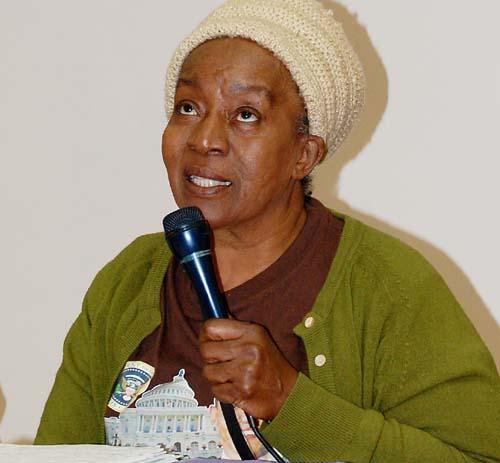The Church of Gethsemane, the Park Slope Presbyterian church (1012 8th Ave.) founded by formerly incarcerated persons, hosted a panel discussion last Sunday featuring those whose lives have been impacted by the criminal justice system.
The discussion commemorated Criminal Justice Sunday, an unofficial nationwide event in the Presbyterian Church designed to bring attention issues surrounding an often neglected population.
The stories of the panelists were, by turns, harrowing, sad, touching and uplifting. Above all, they were powerful, an affirmation of the important work of the 20-year-old church and its pastor, Reverend Liz Alexander.
One panelist, a gentle but iron-willed woman named Malika Alcindor, told the story of her 44-year-old son, Terrance Breazil. Currently in Rikers Island, Breazil has been incarcerated for 18 years, despite having his murder conviction overturned some years ago.
As he waits for appeals and bureaucracy to run their course, Breazil suffers. According to his mother, his diabetes and foot problems have gone largely ignored in Rikers, causing him permanent nerve damage in both feet.
“I’m at the point of writing a letter to the president,” Alcindor said. “I want to say to the president that if you can go all the way and close Guantanamo Bay, you can do something about Rikers.”
Like all the panelists, Alcindor is always looking to turn a negative into a positive: She soon plans to start a watchdog group to prevent abuses by correction officers.
Also sharing his tale was John Flynn, a 51 year old who spent 32 years in prison on an accessory to murder conviction before being released in 2007.
A gifted orator, Flynn spoke of his journey from the youthful fast-life of crime and drugs into one of fulfillment. He now works as a coordinator of a three-quarter house in East Flatbush, serving as an example of life’s possibilities.
Before that, however, his journey of redemption “took me to the pits of hell to find out what the mountaintop is like.”
Like Alcindor, Flynn spoke of abuse from correction officers.
“Prison takes your manhood from you,” he said. “It teaches you that you are not a man, you’re only a man when [the correction officers] tell you.”
During his long stay in prison, many of Flynn’s family members passed away.
“And as crazy as it sounds, in a way I was glad. I didn’t have to worry about how I would feel when a ‘C.O.’ disrespected my mother or hit on my sister,” he said.”
Another panelist was young Davian Reynolds, a 16 year old who grew up in foster care. When he was four years old, he found out his birth parents were in prison.
Inspired for life by the experience, Reynolds — who himself has never been incarcerated — has become an advocate for children of incarcerated parents.
His explanation for his work was simple but eloquent: “When I was little, I knew that they way it was wasn’t the way it should be.”
After the panelists spoke, members of the congregation shared their stories. There was Doris Randolph, whose drug problems in her youth led to her being incarcerated 97 times.
There was Helene Means, another recovering drug addict, who told the heartwarming story of reuniting with the sons she gave up for adoption in 1987.
Many of their stories were made possible by their contact with the church and the Project Connect program it runs.
The program is designed to connect inmates to their home communities and families. If inmates do not have families, no matter: the congregation fills that role.
For released inmates, the group meets twice a month, assisting them with housing, employment, and other facets important to re-acclimation to society.
In particular, many of the panelists thanked lay minister Chibueze Okorie, a former inmate who was jailed for 18 months beginning in 1989 for being a driver in an East New York heroin ring.
Since those 18 months in prison, Okorie has spent the past 18 years helping inmates turn their lives around.
“I believe people can change and productive members of society. But you have to give them the time and the chance to do it. If you don’t have faith in them, if you don’t give them a chance, they won’t do it,” he said.
Okorie has received publicity while fighting for a pardon that would spare him deportation to his native Nigeria. His case garnered attention when a Bush administration pardon attorney made a derisive comment about his ethnicity. The attorney was fired soon after.
Okorie has the support of leaders ranging from Secretary of State Hillary Clinton to local Assemblyman James Brennan.
Said Reverend Liz Alexander, “Now that President Obama is in office, we hope he will be pardoned.”
The case goes back to court in May, Alexander said.























